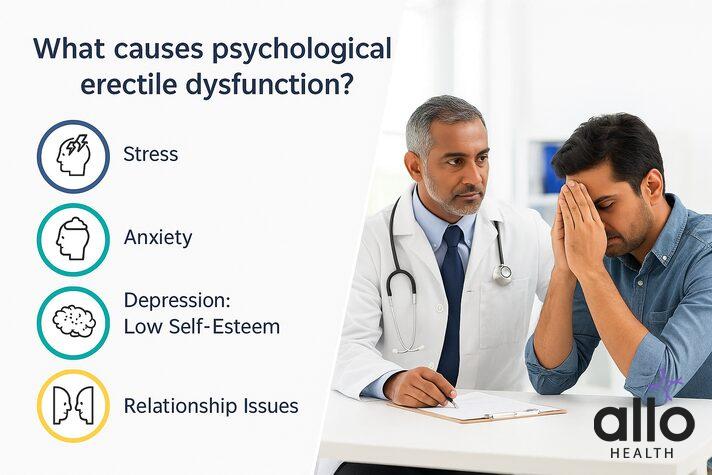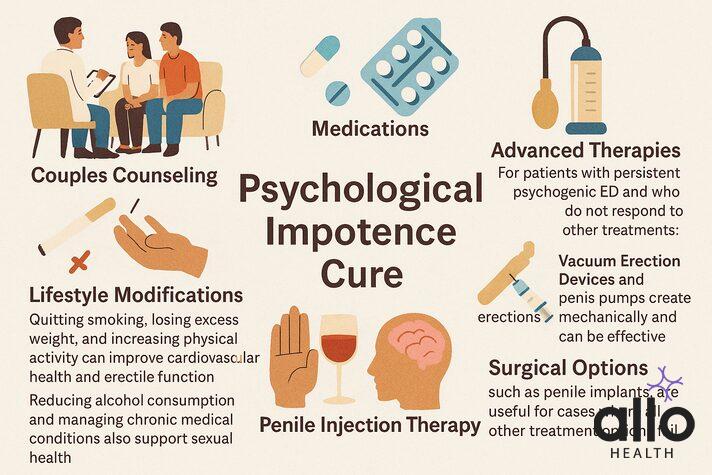Psychological Causes of Erectile Dysfunction: Mind Over Erection?

Psychological impotence, or psychogenic erectile dysfunction, is a common condition where emotional or mental health issues like anxiety, stress, depression, or relationship problems interfere with a man's ability to get or keep an erection. Unlike physical ED, this type often has a sudden onset and may still allow for erections during sleep or solo activity. The good news is that psychological impotence can be cured with the right combination of therapy (such as CBT), stress management, open communication, lifestyle changes, and sometimes medications. Early diagnosis and a holistic approach greatly improve the chances of full recovery and restored sexual confidence.
Erectile dysfunction (ED) is a common condition that affects millions of men worldwide. While ED is often linked to physical causes, some cases can also arise from psychological factors. This type of erectile dysfunction is called psychogenic erectile dysfunction or psychogenic impotence.
The good news is that a psychological impotence cure is possible and many men recover with the right support. The best treatment usually includes therapies to deal with negative thoughts or performance anxiety, couples counselling, healthy lifestyle changes, and sometimes medicines to help build confidence. With proper treatment, most men can fully recover and enjoy a normal sex life.
In this article, we’ll explain the causes of psychological impotence, how it’s diagnosed, and the most effective ways to treat and cure it.
What Is Psychogenic Erectile Dysfunction?
Psychogenic erectile dysfunction is the inability to achieve or maintain an erection sufficient for sexual activity, mainly due to psychological or interpersonal factors rather than physical problems [1]. This type of erectile dysfunction can be caused by stress, anxiety, depression, relationship problems, or other mental health concerns [2]
In the majority of cases, ED can be caused by a mixed origin, where both psychological and organic factors can cause it. Identifying the difference between psychogenic and general ED is important because treatment approaches for both of them may differ.
What Causes Psychogenic ED?
Some psychological factors that can impair sexual function and cause psychogenic ED are:
- Stress and Anxiety: When a person is stressed, becoming aroused can be challenging. One of the common examples for this is performance anxiety. Performance anxiety about sexual performance or being able to satisfy a partner can lead to anxiety, which affects the ability to have and keep an erection.
- Depression: If a person is in depression, it can reduce their sexual desire and the ability to get aroused, which can worsen ED symptoms.
- Low Self-Esteem: If someone is suffering with a negative body image and low confidence, it can create problems with sexual responses. It can create problems with lubrication, arousal and overall sexual desire [2].
- Relationship Issues: Poor communication, unresolved conflicts, or emotional distance between partners in a relationship can hamper the sexual activity, which can cause ED [3].
All of these psychological factors can either cause ED independently or worsen an underlying cause for erectile dysfunction

Real Insights from AlloHealth
Understanding the psychological factors behind erectile dysfunction is essential for effective treatment. Based on patient data collected by AlloHealth, out of more than 1,72,620 people treated, 75,092 men were diagnosed with erectile dysfunction (ED). Among those, over 2,200 cases were linked to mental health conditions such as anxiety, depression, or both. These findings reflect a strong connection between emotional health and sexual performance. For many men, psychological challenges are not just contributing to ED, but they are the root cause. Recognizing and addressing these mental health factors through therapy, counseling, and lifestyle support is often the first step toward recovery.
How Does Psychogenic ED Differ From Normal ED?
The symptoms and causes of psychogenic ED may look the same as ED, but there is a difference. Psychogenic ED has a sudden onset, linked to specific stressors or emotional events, whereas general ED develops gradually over time due to physical changes [1]. Patients with psychogenic ED usually have the physiological ability to have erections, but psychological factors block the normal sexual function in them.
Some characteristic features that distinguish psychological erectile dysfunction from organic ED are as following:
| Characteristic Feature | Psychogenic ED | Normal ED |
| Onset | Acute | Gradual |
| Morning / Night Erections | Present, Normal | Absent |
| Psychosexual problems | Long History | Secondary with other causes |
| Anxiety / Depression | Primary cause | Secondary with other causes |
How is Psychogenic Erectile Dysfunction Diagnosed?
The diagnosis for psychogenic ED requires a careful evaluation to confirm the underlying causes.
- Medical and Sexual History: A detailed patient history is essential, including questions about the onset and duration of symptoms, the presence of erections during sleep, any underlying medical conditions, medication use, and psychosocial factors [2].
- Physical Examination and Laboratory Tests: A physical exam focusing on the genitals, neurological function, and cardiovascular system is done. Blood tests are done to rule out any underlying conditions like diabetes, hormone levels, and cardiovascular risk factors [3].
- Specific tests: Some specific tests that are done to confirm the presence of psychogenic ED are:
- Nocturnal Penile Tumescence Testing: This test measures erections during sleep. If nocturnal erections are normal, it is a sign of psychogenic ED [4].
- Ultrasound and Vascular Studies: These may be used if vascular causes are suspected [2].
- Psychological Evaluation: Screening for depression, anxiety, relationship problems, and other mental health issues is also an important factor for diagnosis. Questionnaires like the International Index of Erectile Function (IIEF) and Sexual Health Inventory for Men (SHIM) help to rule out these symptoms [2]

What Is Psychological Impotence Cure?
Psychogenic erectile dysfunction treatments require addressing both the psychological and any physical causes. A multidisciplinary approach for this can help in getting the best results.
- Psychological and Behavioral Therapies
- Cognitive Behavioral Therapy (CBT): This therapy helps patients identify and modify negative thoughts and anxieties related to sexual performance [1]
- Couples Counseling: This is a type of couple talk therapy which involves partners who can improve communication, reduce relationship stress, and increase intimacy [3]
- Pharmacological Treatments: Medications such as phosphodiesterase type 5 inhibitors (Viagra,sildenafil citrate, Cialis, Levitra) can be used to assist erections by improving blood flow. These drugs do not increase libido but can help reduce performance anxiety by enabling a more reliable erection [2] [3].
- Lifestyle Modifications
- Quitting smoking, losing excess weight, and increasing physical activity can improve cardiovascular health and erectile function.
- Reducing alcohol consumption and managing chronic medical conditions also support sexual health.
- Advanced Therapies: For patients with persistent psychogenic ED and who do not respond to other treatments:
- Vacuum Erection Devices and penis pumps create erections mechanically and can be effective.
- Penile Injection Therapy with some agents like Papaverine, Phentolamine , Alprostadil and Trimix may be considered.
- Surgical Options, such as penile implants, are useful for cases where all treatment options fail.

Is Psychological Erectile Dysfunction completely curable?
People who have had normal erectile function in the past often respond well to psychological therapy, and medical treatment [4]. However, in a psychogenic ED, where a man has never been able to maintain an erection sufficient for intercourse, may require more intensive and long-term intervention.
Open communication with healthcare professionals and partners, along with addressing underlying psychological issues, can greatly improve the treatment outcomes [5]
Conclusion
Psychogenic erectile dysfunction is a condition that can occur from psychological factors such as stress, anxiety, depression, and relationship issues. Unlike ED caused by physical problems, psychogenic ED often has a sudden onset and can occur even when the body is physically capable of normal sexual function. The good news is that with early diagnosis, proper psychological support, lifestyle changes, and sometimes medication, many men see significant improvement or even complete recovery. If you’re experiencing symptoms of erectile dysfunction that seem linked to your mental health, don’t ignore it. Seek professional help. Psychogenic ED is not permanent, and with the right therapy, medical support, and emotional healing, a healthy sex life can be restored.
Psychological erectile dysfunction is often under-recognized but highly treatable. Addressing psychological factors such as anxiety, depression, and relationship stress through therapy and lifestyle changes can significantly improve erectile function. Early diagnosis and a comprehensive treatment plan are key to successful outcomes.
"The following blog article provides general information and insights on various topics. However, it is important to note that the information presented is not intended as professional advice in any specific field or area. The content of this blog is for general educational and informational purposes only.
Book consultation
The content should not be interpreted as endorsement, recommendation, or guarantee of any product, service, or information mentioned. Readers are solely responsible for the decisions and actions they take based on the information provided in this blog. It is essential to exercise individual judgment, critical thinking, and personal responsibility when applying or implementing any information or suggestions discussed in the blog."






